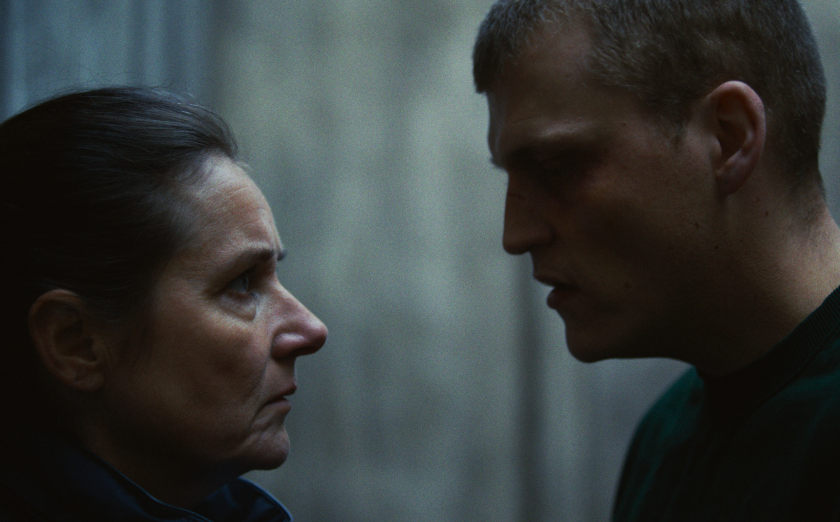Vassilis Kroustallis reviews Gustav Möller's (Guilty) new prison drama, 'Sons' (Vogter).
Gustav Möller (of 'Guilty') makes another powerful (if expected) portrait of morality under claustrophobia in the much-researched and sober -yet accessible- 'Sons' (Vogter). Moving from the Police emergency calls to a prison setting (in the narrow 'Academy' shooting ratio), he gets Eva (Sidse Babett Knudsen) as a prison officer who realizes that Mikkel (Sebastian Bull), her son's murderer, is about to be transferred to the same prison she works. Eva is a mother figure in her ward; when Mikkel is allocated to a different, high-security, ward, she asks for a transfer, citing false information about colleague issues. She gets the transfer she requested. Then the game of cat and mouse begins, with Eva trying to undermine Mikkel's position in jail in all possible ways -and Mikkel learning to respond in more ways than violent ones.
Möller and his co-screenwriter Emil Nygaard Albertsen carefully advance the script from a prison version of 'Cuckoo's Nest' (with Eva in the Louise Fletcher role) to a 'Dead Man Walking' Susan Sarandon character. These two extremes fit admirably in 'Sons' because they are never simultaneously present in Eva. Both maternal responsibility and maternal revenge alternate like a digital on/off switch function -and expectations are cleverly thwarted (and interest sustained) accordingly. (Even though 'Sons', by negating any background info for Eva, sometimes moves too closely into wholeheartedly embracing the Medusa/Sister Theresa archetype for its central character).
'Vogter' also increases its interest by the two main characters' interactions (in a beautiful pas de deux by Knudsen and Bull); the chased and the chaser, the more reluctant to open and the one trapped in their own defenses are not always the same person. And the narrative bits take some unexpected turns, precisely at the point when you think that the one character can do no more harm to the other -and get away with it. Möller won't separate Eva from the mostly male-dominated prison officers (as expected, all high prison officials are male); she's simply doing her job the best way she thinks. This unobtrusiveness makes it harder for her to operate as a grieving mother. Her closetedness fuels the film as much as Mikkel's compulsive-aggressive behavior.
Some moderately tense scenes alternate with other maternal scenes, in which Mikkel's mother has a corresponding function to fulfill. For all its narrative shrewdness and cinematographic power of a moody prison environment, 'Sons' still feels best in its moment of abandonment. Its Protestant alignment with responsibility and sin shows best in Eva's encounter with the priest, when she needs to let her guard down; or even in her voyeuristic observance of what a mother's role is like (a role she was violently deprived of). There is not a single moment of boredom in 'Sons'; yet the prison drama genre somehow locks the film into accepting a procedural story with a character who needs to be discreet rather than disclose things. That is why the (few) scenes of letting things go ring very genuine in the film, which otherwise features meditation and schooling as a prisoner's practice -but negates that practice and relief to its main character.
'Sons' is reality-driven in its mise-en-scene, and perfectly suggests that the enclosed world is the safe world (a visit to the outside world leads to disaster). It is also contemporary, with figures like the prison Rami (Dar Salim) representing the appropriation of the former outsider into Denmark's multicultural milieu. It triggers moral concerns, but rarely invokes deeply felt existential agonies - yet it is straightforwardly sincere in its statement that responsibility has both an admirable and a deplorable quality.
'Sons' (Vogter) screened in competition (world premiere) at the 74th Berlin Film Festival.
Vassilis Kroustallis


